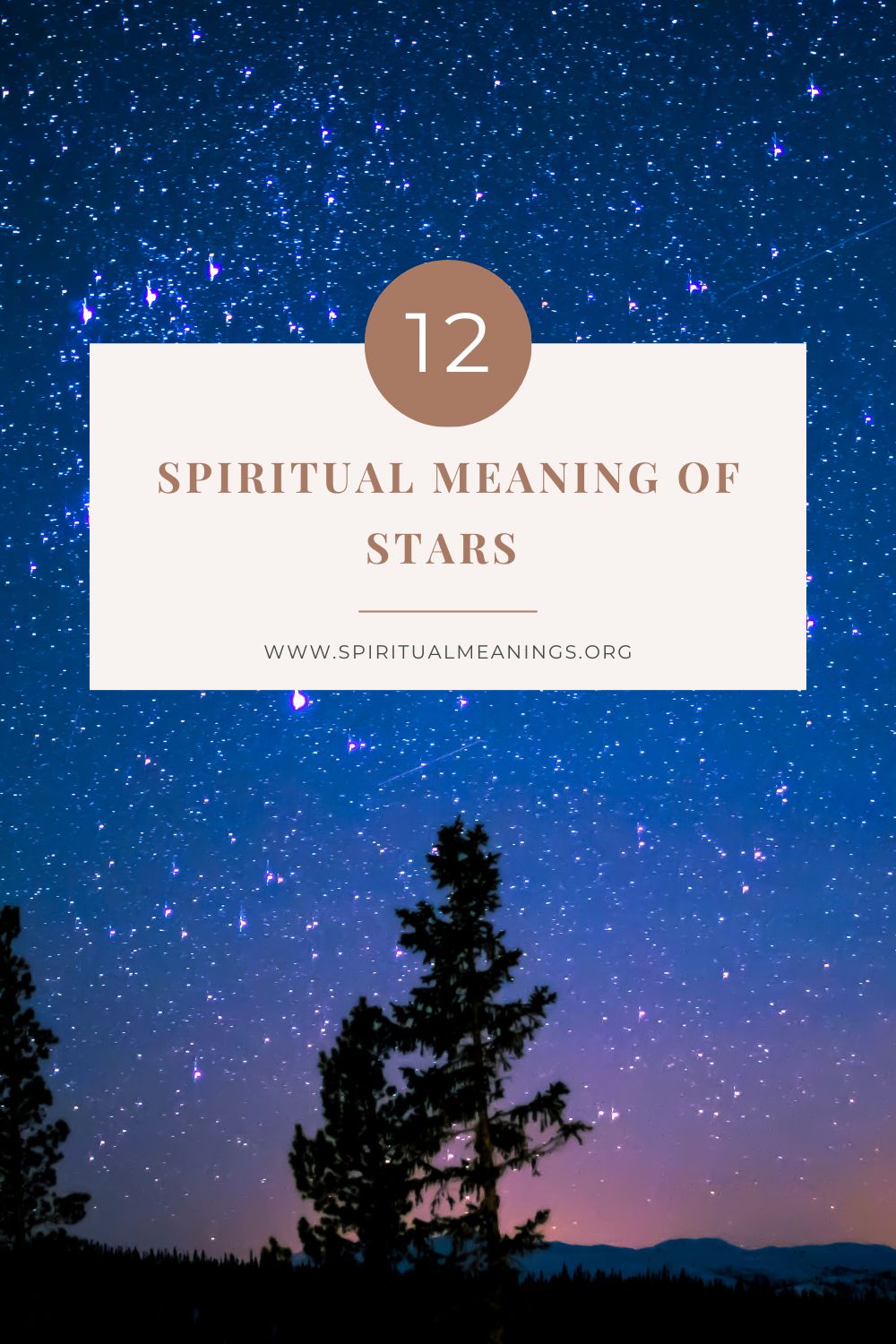When we look up into the skies at night, like people have done for millennia, we gaze at the stars twinkling above our heads with a sense of awe and wonder – and it’s little wonder that the stars have acquired deep spiritual meaning in many cultures around the world.
The stars have meant many different things to all kinds of people at various times – so in this post, we discuss stars’ spiritual meaning to help you understand some of their symbolism.
Spiritual Meanings of Stars
-
Guidance
Since long before the invention of the compass, people have used the stars to help them navigate, and as a result, they have also come to represent guidance spiritually and in life too.
Sometimes, people talk about their “guiding star”, and this is similar to talking about a guardian angel – a star twinkling in the heavens and looking down upon us can be seen as a manifestation of a guiding spirit.
Furthermore, if you are feeling lost or alone, spending time outside under the night sky and contemplating the challenges you are facing can bring solace and answers. For some, doing so feels like getting in touch with a guardian angel to ask for help.
The peace you can find sitting under a silent sky that’s glittering with stars can help you see things more clearly, and taking the time to do so is also a good way to find the inner stillness that’s essential for spiritual growth.
Stars can offer guidance in another way too since people often consult the stars for their horoscope before making decisions.
Your horoscope can tell you which kind of behaviors are most likely to pay off during a certain period, and this can be used to help guide the choices you make if you are not sure which way to turn.
-
Hope
Stars can also symbolize hope and optimism. Although we now know that the stars we see in the sky are actually huge burning balls of fire at unfathomable distances from the Earth, they still seem to appear each night with a delicate and cheerful twinkling.
This reminds us to face the future with positivity, and by doing so, we can achieve anything we set our minds to and work hard for.
-
Success and excellence
Another very common meaning that stars have is that they are used to represent success and excellence.
When schoolchildren perform well, sometimes teachers stick gold stars on their work to show that they have done an excellent job – and the best in the class are often referred to as “star pupils”.
Similarly, in the business world, a young employee who is seen as having great potential can be described as a “rising star” who is earmarked for promotion. The same could be said of a young politician who is seen as having a bright future.
Even in the world of showbiz, we often use the words “celebrity” and “star” interchangeably, and all of these expressions show how the language we use reflects the way we see stars as representing success.
-
Goals
Similarly, stars also represent the goals we hope to achieve.
When we want to encourage a child – or even an adult – to follow their dreams, we might tell them to “reach for the stars” or “shoot for the stars”, which means they should aim high and strive to do their very best.
The twinkling stars in the sky can bring us motivation, and as bright, shiny objects far away, they also represent the bright and positive future that can be ours if we are willing to work hard with determination and perseverance to obtain it.
-
Fate
The idea that the stars play a role in our fate has been a common belief among many cultures around the world.
We’ve already mentioned horoscopes, and the whole system of astrology is based on the belief that the position of the stars and the planets can affect events in our lives.
This is also reflected when we used expressions such as “it’s written in the stars”. This means that an event is predetermined by the stars and is destined to happen.
For example, we might say that it was “written in the stars” that two people would meet, meaning that they were meant to be together.
From the beginning of time, people have gazed up at the night sky, and the constellations they saw were seen as playing a role in determining our fates.
-
Good luck
Closely related to the concept of fate being written in the stars is the idea that stars can bring us luck.
One tradition has it that you can “wish upon a star” when you see the first star rising in the evening, bringing you luck and good fortune.
Similarly, when you spot a shooting star in the sky, something far rarer, according to the custom, you should also make a wish.
Another expression, “born under a lucky star”, is related to both fate and good luck, and it tells us that a person was born at a particularly propitious time. As a result, they can expect to have lots of good luck in their life.
Finally, when you experience unexpected good luck, you are told to “thank your lucky stars”, one more saying that reinforces the idea that the luck we experience on Earth is closely related to the stars.
-
Protection
On a particularly dark night, the stars in the sky can provide a certain amount of light to guide our way, and as such, stars can also represent protection.
We’ve already seen that stars can symbolize our guardian angels watching down over us, but the light they provide can also keep us safe from the dark and all the terrors it hides.
-
In Christianity
Stars have played an important role in Christianity, and one of the most famous stories concerns the birth of Jesus.
When Jesus was born, the Magi – or the Three Wise Men – were led to Bethlehem by a star. In this story, they were informed of the momentous occasion of Jesus’ birth by the star shining brightly in the sky.
In early Christianity, the pentagram – or the five-pointed star – was also used to represent the five senses as well as the five wounds Jesus suffered during his crucifixion.
-
In Judaism
Probably the best-known and most easily recognized symbol of Judaism is the Star of David, the six-pointed star.
The history of this distinctive star dates back to the 17th century when it was adopted by the Jews of Prague as a symbol used to represent their identity.
By the 19th century, it had come to be used across Eastern Europe, and nowadays, it also appears on the national flag of Israel.
As a simple geometric design, this star had previously been used in other contexts before it became accepted as the symbol of Judaism.
During a darker episode in its history, during World War II and the Holocaust, the Star of David was also used by the Nazis as a symbol to identify Jews.
-
In Hinduism
One example of the six-pointed star appearing in non-Jewish contexts is in southern India where it is used in temples to symbolize spiritual balance and harmony due to its perfect symmetry.
-
In Taoism
In Chinese Taoism, the 五行 Wu Xing, a five-pointed star, represents the five elements of fire (火 huŏ), earth (土 tŭ), metal (金 jīn), water (水 shuĭ) and wood (木 mù).
-
The mysteries of the universe
Nowadays, we know what stars are – but until relatively recently, people would have looked up at the sky with no idea what those twinkling lights could be.
Indeed, it was only through developments in science from the 16th century onwards that people began to understand the lights in the night sky – and it wasn’t until the 19th century that it was finally proved that the stars are suns like our own at great distances from the Earth.
For this reason, for the majority of human history, people have looked up into the sky at night and wondered what it is they can see.
As a result, the lights in the sky have always symbolized the mysteries of our existence and our place in the universe – and in a sense, they still do.
When we look up into the sky and see the stars twinkling above our heads, with the knowledge we now have, the immense size of our galaxy and the universe beyond it reminds us of how tiny and insignificant we are.
At the same time, despite all the advances in science, it also reminds us of how little we know about what’s out there, and so even now, the stars still represent the unknown mysteries of the universe.
Many meanings to people at different times
As we have seen, the stars have meant many things to various peoples around the world at different times – and they still possess a potent symbolism.
Whether they represent fate, chance, luck, hope, guidance or simply the esoteric mysteries of the universe, when we take a quiet moment to gaze up into a sky full of stars, we can hardly fail to experience the wonder we feel as a deeply spiritual moment.











